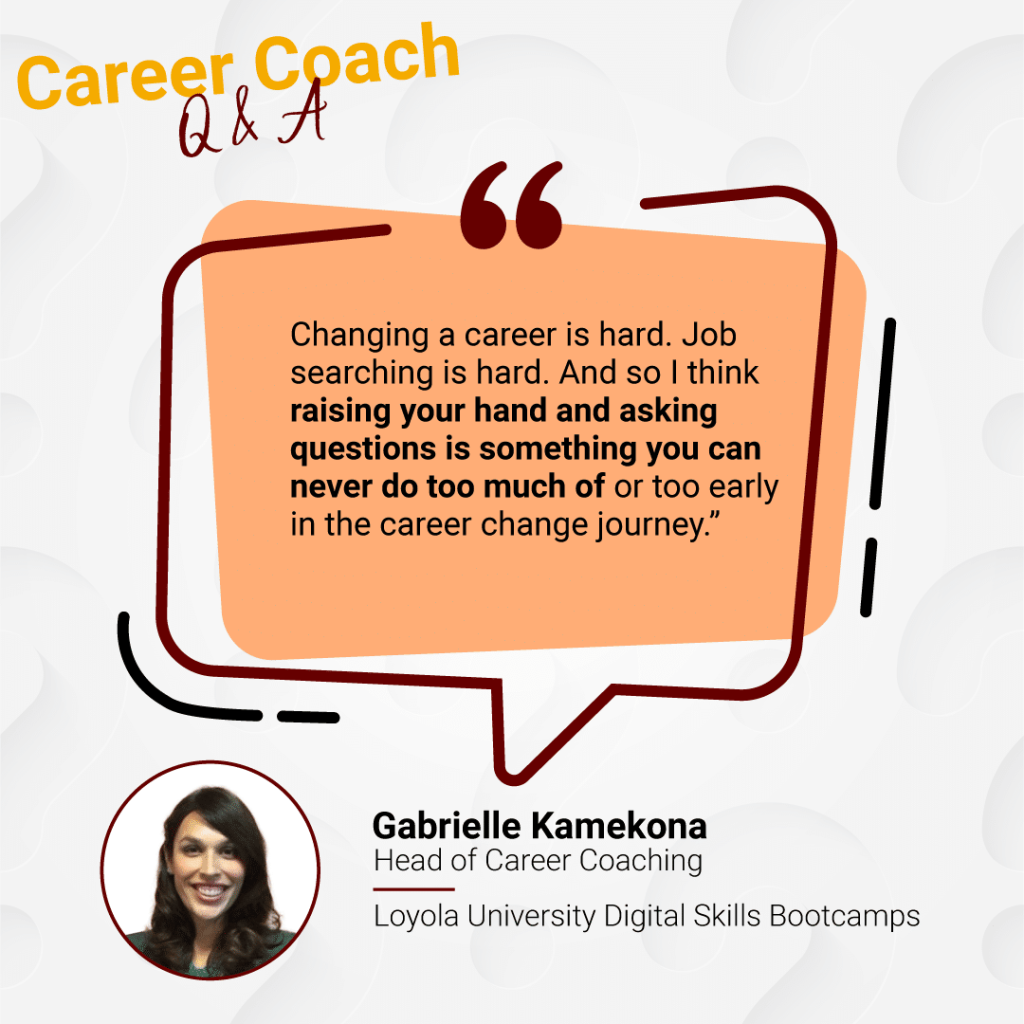Career Expert Q+A: Switching Career Paths

Career Expert Advice:
How to Switch to a New Career
Changing careers can feel like an overwhelming decision, and that’s okay! It’s not a decision to be made lightly.
Many people have made complete career changes successfully, and anybody can do it with the right direction, determination, and support.
According to a Career Change Report conducted by Indeed, 49% of the 662 participants said they made a “dramatic career shift,” and 65% of those who haven’t made a career change said they were “either thinking about or previously considered, switching.”
While making a career change is within reach for anyone, it is important to have a plan.
In fact, 83% of the participants in the Indeed report who said they had changed careers before, said they had planned their career change in advance, “and spent an average of 11 months thinking about the move before making it.”
To help you take the next steps and pivot your career, we asked an expert career coach to answer some of the most important questions on career pivoters’ minds.
Expert Weighs in: How to Change Careers Successfully
Question: The two most common things we hear from career changers is that they either love their job but don’t have job security, or, they have job security but do not feel passionate about their work—or worse—feel miserable about it.
What advice would you give to each of those groups?
I would say there are a couple of pieces of advice that I think are true for career changers who fall into BOTH of those categories.
You DO want to be passionate about what you do, so changing careers is about finding that next stage you can be passionate about.
I think the reality is that we’ve evolved into such a digital, technological world, that these are the markets (digital and IT) that are growing exponentially in ways that we will not see other job markets growing.
So if you have—or can find—a passion in a field related to digital or IT industries, you have an invaluable opportunity here because this is where the employment world—and the world in general—is going.
Question: What about the people who love their jobs but do not enjoy their field of work either because of a lack of job security or incompatibility with their lifestyle?
My advice would be to think about the fact that the healthiest kind of work is the kind that gives you both peace at work and peace at home. That means you feel really good when you walk into your job on most days, and you feel good when you leave because you enjoy what you’re doing.

You also want to feel good when you get home. You want to feel like you’re not sitting around stressing about your next day, week, or month. You want to have a good sense of where you’re at and where you’re going.
I would also say to remember that work/life balance is incredibly important. If I were their career coach, I would help them plan the next phases of their career journey by first figuring out what they need to be happy both at work and in their personal lives.
Question: What would you say to those who have a reliable career that pays well but don’t feel passionate about their work—or worse—feel miserable at work.
People in that situation are on the opposite side of the spectrum—they love to get home from work and love when their workday ends because things are better outside of work.
But the truth is, we spend quite a bit of time in our work world and if you’re spending that much time doing something you are not passionate about, then you’re not getting the best fulfillment out of your career that you can.
Finding a path you are passionate about will give you a greater sense of that work/life balance because you’ll be enjoying both of those parts of your life.

For both groups, it’s really about finding that passion—or that next passion—and then figuring out how that really aligns with where you are in your personal life, and that’s something that people really have to think about when they make their next choice.
Question: What types of sacrifices should career changers expect to make?
Career pivoters need to realize that changing careers, in general, is hard work.
I say that because it’s not only about building a new skill set but also about the job search itself, and often when we are thinking about changing careers, we don’t think about how finding a job is also like a full-time job.
So when you decide to level up in a new skill, not only will you need to devote time, energy, and effort, but you will have to make sacrifices with family, friends, and free time to build that new skill set and get hired.
That means you’re also going to have to carve out the time to do the job search.
No one can go in and get the job for you, so you have to think about the fact that you will have to look for jobs online, fill out applications, and go to interviews.
You will also need to make time to network, have conversations with employers, and create a place for yourself in that field, and that’s also hard work.
Of course, everyone’s sacrifice will be slightly different depending on what their situation is, but it is a sacrifice—not only to build the skill set in a new career, but also to do a job search.
Just remember that the sacrifice is potentially longer than just the education or program someone attends and to factor that into your expectations.
Question: What would you say to someone who knows they want to change careers but have no idea what they want to do. What should the “soul-searching” journey involve?
Changing careers takes a leap of faith.
It takes a leap of faith in yourself and so, I’m a big fan of the advice to believe in yourself and believe that you can do what you set out to do. As long as you are willing to put in the hard work and willing to make personal sacrifices to have a better outcome, you can do it.

Like with anything else, plan. Any forethought you can give to your career change plan is highly recommended. Before you pick a career, do some research, take an online class, dabble in something, or read up on the subject of your interest.
I would also recommend to someone interested in a career change: look at what the job market looks like. Don’t rely on other people to give you that data—look it up for yourself. There are many different labor statistic websites, city-specific sites, job boards, and many other free tools you can use to:
- Look at what the job market is like for a certain career
- Decide if this job will be lucrative enough for your lifestyle
- Set yourself up for realistic expectations about salary, happiness, etc.
That can help you narrow down your search, reinforce your choice, or even make you rethink your choice.
I think the better prepared and informed you are, the more likely you are to follow through.
Question: What would you say to someone who is battling with self-doubt or isn’t sure if they have what it takes to pursue some of the careers they are considering?
I think there are a couple of things. First of all, imposter syndrome and self-doubt—they’re creepers. I think we would be fooling ourselves if we didn’t say we’ve all felt that at some point.
Even if you are pretty established in your career, there are moments of self-doubt and moments of feeling this imposter syndrome.
The first thing you have to do is realize that it is normal to feel that way.
Second, in the digital space, there are lots of ways to sort of dabble in the field without committing or sacrificing too much. Whether it’s free online courses, YouTube videos, webinars, or even Ted talks, there are ways to get an understanding from people who do the job, people who are looking to hire for the job, or even people who have done a career change.
There is so much information out there that my recommendation would be to look at what is out there, do that dabbling, and if there is real self-doubt, start a conversation with someone in that career field.
LinkedIn is such an amazing resource that we often do not use to its fullest potential. We forget that people love talking about what they do if they are passionate about it, and they love to share it.
So if you’re someone who isn’t sure about the career path you’re exploring, find someone in the industry on LinkedIn and ask them, “Listen, I’m looking at pursuing this as a career and I’m not sure. I would love to get coffee with you or pick your brain for 15-20 minutes.”
We often forget that people love to be mentors and love to help the next generation in their field. So don’t be afraid to send out some of those messages. LinkedIn is a powerful resource in that way and we often forget to use it.
Question: What unique challenges or benefits do you face when changing careers in your 20s?
The great thing about being a career changer in your 20s is that you’re not married to any skills yet. You probably haven’t been working in your career long enough to know exactly what is your niche or wheelhouse.
The benefit is that it’s a great time to experiment and it’s also a time when employers don’t worry as much about what your resume looks like. They expect someone in their 20s to have bounced around different jobs or recently graduated from college.
The downside is that you do not always have the experience or the wherewithal to leverage the experience you do have to make you sellable to your next endeavor.
The advice I would have for someone in their 20s is to try to find a career coach. Career coaches are kind of spectacular at helping you understand which translatable and transferable skills you have—even from your education.
And if you don’t want to find a career coach, I recommend researching “translatable skills” and “transferable skills” to learn more about it on your own.
Question: What unique challenges or benefits do you face when changing careers in your 30s?
The 30s are probably your prime to be a career changer. It’s considered normal, you do have some skills, and you have definitely created some transferable skills from almost any field you’ve worked in.
People forget that some of those human skills are so important—soft skills like how to talk to people, empathy, problem-solving—those are so vitally important, regardless of what field you’re in, which means that in your 30s you probably have those from your previous work experience.
Question: What unique challenges or benefits do you face when changing careers in your 40s and 50s?
As you get into later decades in your life, the challenge that you have is that you’ve potentially pigeon-holed yourself into a career. If you didn’t jump around and experiment in your 20s and 30s, your resume starts to look very standardized, showing similar skills, tools, and expertise throughout your entire resume.
If that is the case for you, my advice is this: In your current role, ask to do something different. If you are in a leadership role, ask to do something functional. If you’re in a functional role, ask to take on a leadership project. Maybe even try to go outside of your department to learn something.

This gives you the opportunity to add to your resume the fact that you can be agile, hungry, humble, interested, willing to learn—those are qualities that people are looking for and you can demonstrate those by doing those other roles.
Question: What unique challenges or benefits do you face when changing careers in your 50s and 60s?
In later decades, we always worry about ageism. There are tactics and methods to deal with that on your resume.
There are also opportunities in remote work, which has really opened the door to varying demographics. Since we are in a pandemic, remote work is at its height in many ways, and so, those are interesting things that I would advise career changers in their later decades to consider.
Question: What are some of the most common mistakes you’ve seen your clients make during their career change journey?
I would say a couple things:
First, people often say to themselves when they’re thinking about changing careers, “I’m not ready yet.”
By saying that, they’ve already determined for themselves some preconceived notion about what “ready” means. What I mean by that is, they’ve said to themselves, “I need A, B, C skills. I need X number of practice sessions. I need Y weeks in an internship.”
They’ve preconceived something in their minds and often end up not hitting the ground running because of it.
I think that’s a huge mistake because once you’ve established that you have a new desire, you can start doing things in that field even if you have not developed the skills yet. You can network. You can meet people. You can find a mentor. You can start to go to events so you can get a better sense of that field.

By doing those things, you’re also showing people an elevated passion, and I can promise you that employers are looking for passion.
I would say that’s the number one mistake—people giving themselves a very specific timeline or a very specific view of what they need to have done or learned to be ready for the job market.
The second common mistake I would say is that people don’t use their existing network very well. We often forget that people we know—even people that we work with—know other people who are in your desired career path, or interested in connecting people.
I think we forget to use our network.
Question: Are there any other common mistakes you’ve seen your clients make during their career change journey?
The final mistake I think people make is that they don’t raise their hands and ask questions when they feel stuck.
They might get stuck in the career-change process because they don’t want it to seem like it’s not going well and they don’t want to admit that maybe it’s not going as well they hoped or expected—but this ends up holding them back.

I would say a lot of people feel that way because changing a career is hard. Job searching is hard. And so I think raising your hand and asking questions is something you can never do too much of or too early in the career change journey.
Gabrielle Kamekona is the Head of Career Coaching at the Loyola University Digital Skills Bootcamps. She leads a team of experienced career coaches and career development workshops for students and graduates of our programs.
For more information about the Loyola University Digital Skills Bootcamps call (504) 475-1400 today.

